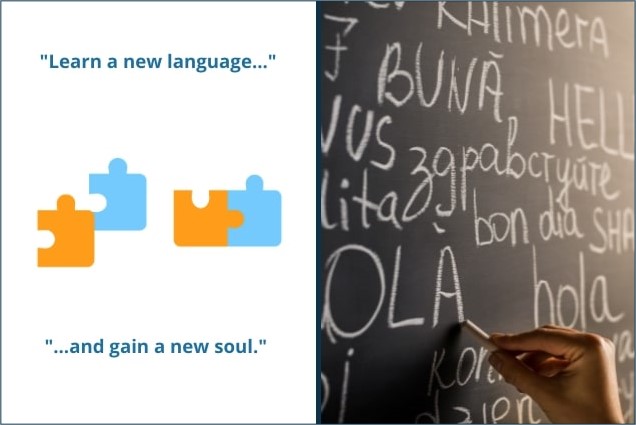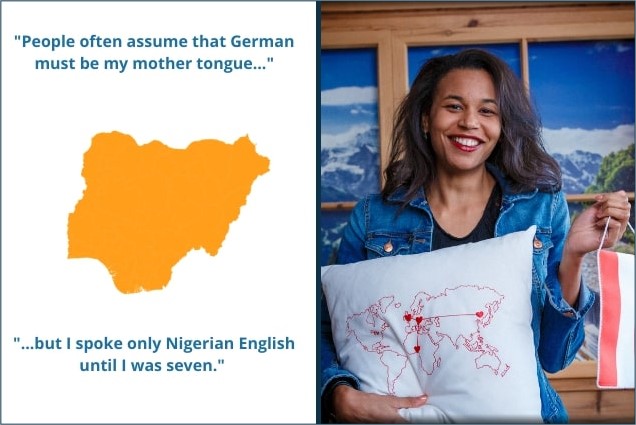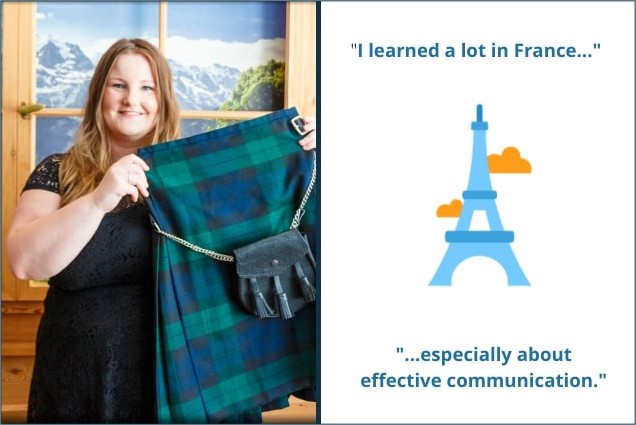The InterNations Team is not only international, but also multilingual. In total, our team members speak about 40 languages fluently, and many are passionate about language learning. For InterNations Language Week, they talk about the impact that various languages have had on their lives.

Michael: The Chinese Connection
Michael, one of our HR managers, has always been interested in foreign languages. At school, he enjoyed his French and Italian lessons before going on to get his bachelor’s degree in German and Italian. As a hobby, he has also dabbled in a dozen other languages.
“I’ve always wanted to tackle a brand-new language outside of a formal setting. I planned to learn a lot of languages over the years. For example, I rather like the way Russian sounds, so I tried to teach myself Russian for a while,” he remembers, explaining that he found it difficult to keep up with a new language all by himself. “It’s not just about the language. It often comes down to having an interest in the culture of a country where it’s spoken. I didn’t feel this connection with Russia.” Gradually, his Russian fell to the wayside, just like the other languages.
Michael rediscovered his passion with a language he hadn’t even considered. “In 2018, I was planning a trip to China to visit my best friend. She advised me that it would be difficult to get by with English, even in a huge, Westernized city such as Shanghai.”
So, he downloaded a language-learning app to get started with Mandarin. “When I went to China, I stopped being nervous about my language skills. Since so many people didn’t understand English, this gave me the confidence to try some basic Mandarin. I just blurted out anything I could think of, which worked out surprisingly well,” he laughs. “A little definitely goes a long way — they often seemed surprised I was making an effort.”

Soon, Michael found his app far too easy and repetitive. Therefore, he decided to go down the official route of Chinese language exams. By now, he has worked his way through the course materials for two out of six exams for the Hànyǔ Shuǐpíng Kǎoshì (Chinese Proficiency Test).
“After passing the second exam last year, I’ve slowly been working my way towards the next one. The first two were very straightforward, but the third is a lot more difficult. The grammar becomes more complex, and there’s quite a bit of new vocabulary to cover — at least 600 new characters!” Nevertheless, Michael is determined to keep going.
Finally, he has found that elusive motivation. He has cultivated an interest in the history and culture of mainland China and especially Taiwan, also due to his friendship with Jasmine, a Taiwanese colleague. “I set myself a personal deadline. I’d like to combine the next exam with my next trip to China or Taiwan. I like to think it will be possible to go there within a year or two. Once I’ve booked my flight, things will fall into place.”
Stephanie: The Challenges and Benefits of a Multilingual Childhood
For Public Relations Manager Stephanie, language has always been about family and belonging. She was born in Austria but spent most of her early childhood with her mother in a small town in Nigeria.
“People often assume that German is my mother tongue,” she explains, “but I didn’t speak it until I was about seven. My dad, who’s Austrian, also lived and worked in Nigeria some of the time — his job required a lot of international travel. But he spoke only English there, and everyone else spoke casual Nigerian English or an African language, such as Igbo or Itsekiri. We’d visit my family in Austria, of course, but they also spoke English to us.”
Her family decided that Stephanie should go to school in Austria, and her first linguistic challenge was to become fluent in German, fast. “My parents wanted me to go directly to a local primary school, but the school asked them to send me to kindergarten for a year instead. Sometimes, this kind of advice is considered stigmatizing in Austria, especially for non-German speakers, but honestly, in my case, it was the right decision. I felt pretty overwhelmed already.”
Fortunately, her first teacher in primary school took the time to give her some extra support whenever she needed it, and Stephanie still remembers her fondly. However, other teachers weren’t as supportive. Some even made off-hand remarks about her language skills, which felt devastating to a kid trying to fit in with her peers.

As soon as she’d mastered German, the next challenge was waiting for her — English. She attended a bilingual secondary school, where most subjects were taught in English from day one.
However, she soon came to realize that the English she’d grown up with — the highly informal Nigerian Pidgin — was quite different. “I had to relearn many words and all the grammar rules — for example, there are none of the typical tenses in casual Nigerian English. This was took me quite some time to figure out.”
At some point, everything just “clicked” for Stephanie. “Some of my classmates struggled with all the foreign languages we had to learn, but this didn’t faze me anymore. I’d already gone through a similar process twice. In comparison, even Latin classes were fun, and I absolutely loved French and Spanish.”
And today? “Today, I speak the local dialect with my Austrian family and friends. But with my mum and my sister, I talk in Nigerian English. I also think in Nigerian English a lot, especially if I’m being really emotional. German, on the other hand, is something I’m proud of. It made me feel like less of an outsider, and it’s a reminder of everything I’ve achieved, such as my previous career as a journalist. And sometimes, I wish I could speak Slovenian, too, to connect with my Slovenian heritage from my dad’s side.”
Samantha: Life Lessons Learned in France
Social Media Manager Samantha worked as a language assistant as part of her degree course. “I studied history and French, so I had to spend a year abroad,” she explains. “And I love all things French since I have family in Toulouse.”
Her personal connection to France made her excited about living in a small town near Lille for a year, but she also made this decision in view of her future career. “I was considering becoming a teacher. If you want to work as a secondary school teacher in Scotland, you have to get a degree in your chosen subject first and then you need an additional degree in education. I thought it would be nice to get some actual teaching experience too.”
Language assistants don’t have to meet any formal requirements. Most of them are foreign language students like Samantha. They are supposed to support the teachers or to work with small groups of students in order to increase their confidence with foreign languages and their interest in other cultures.

Samantha worked at a French collège, which covers secondary education from ages 11 to 15. She soon discovered that it was anything but easy to spark that interest in a classroom full of teenagers. “Some of them were just very shy and felt easily embarrassed, while others were going through all that adolescent drama. There were a couple of classes that could be extremely challenging.”
After her students had started throwing things out the window during a lesson, Samantha slowly realized she might not want to be a teacher after all. “It was more of a societal assumption, based on my degree in history and French, not a personal passion.”
Nevertheless, she doesn’t regret her experiences. Without them, she might have embarked on an education degree and changed her mind much later. “And I learned a lot in France,” she reflects. “I needed to explore and better understand English to anticipate the questions my students would ask. I also had to work on my Scottish accent, so I could communicate better with the children because I was absolutely not allowed to speak French with them.”
Outside of school, Samantha spoke French with everyone, which helped her improve her own language skills and gain more confidence. And despite her occasional struggles in the classroom, her job taught her an important lesson about effective communication: “Know your audience and tailor your message to them. For example, I spent so much time looking up the movies, pop stars, and video games my students were into, so I could keep them engaged and motivated. The principle stays the same, no matter if the person you’re talking to is 15 or 50.”
Andre: From Linguistics to Software Development
For Andre, a software engineer from the Backend Team, language is one passion that has stuck with him all his life.
Growing up in a Ukrainian family in Moscow, he tuned into a Soviet radio program about classic French chansons as a child. “I immediately fell in love with the music and the language,” he remembers. “I begged my mother to let me learn French for years.” When he was ten, his parents found a private teacher willing to tutor him, which wasn’t as easy as it sounds.
“Teachers were often reluctant to take on a blind student, and back then, it was very complicated to find suitable language-learning materials. Fortunately, my teacher saw it as a challenge, not as a problem, and found a workaround solution. She was really great!”
When Andre had to choose a university education, he was torn between his interests. “I’d attended a music school, but in the end, I lacked the technique and the drive for a musical career. It came down to a choice between linguistics and my other hobby, computer science.”

Again, the computer science department turned out to be rather hesitant about accepting blind students, citing potential obstacles, for example, graphics-based programs he’d have to write in class. “Today, I know it would have been tough, but feasible,” Andre says, “but then I was afraid. So, I enrolled in a French linguistics course instead. I thought I could always combine my personal passions later in life.”
He already did so in his thesis, compiling a trilingual technical dictionary of IT terms and definitions. After graduating, he worked as a lecturer at the French department until he moved to Ukraine, his wife’s home country. “I’d written programs before, just for fun, but she actually has a background in mathematics and computer science. It was she who taught me the most important things about programming.”
In Ukraine, Andre worked as a freelance developer before finding the perfect opportunity to merge two of his interests, analyzing languages and writing code: software localization services. “If you take a product manufactured by an American company for an audience that speaks English and uses the Latin alphabet, adapting this product to various international markets is going to pose some challenges. You can’t just translate the copy word for word.”
“My current position at InterNations is my first pure programming job. In university, I used to be a hobby programmer. Now I’m just a hobby linguist,” he jokes. “But I’m still very interested in many topics, such as phonology, computer linguistics, and the future of voice assistants.”
Image credit: InterNations/iStockphoto